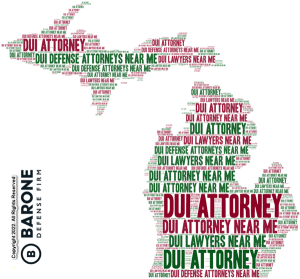Search
License Restoration Revocation Lawyers in Michigan
Has Your Michigan Driver License Been Revoked? This article will explain the process for getting it back.
Key Points:
- Check eligibility and obtain a complete driving record.
- Prepare necessary documents, including substance use evaluation, drug screen, and letters of support.
- Request and prepare for an administrative hearing.
- Address any indefinite suspensions by clearing fines and obtaining court clearance.
- Seek legal assistance from a Michigan DUI Lawyer for guidance and support.
How We Can Help
The DUI lawyers at the Barone Defense Firm can help you get back on the road if:
- Loss of License after Breath or Blood Test Refusal – A Michigan implied consent hearing occurs when a driver refuses a chemical test during a DUI stop, potentially resulting in an automatic license suspension. At the hearing, the driver has the opportunity to contest the suspension by challenging the validity of the traffic stop, the arrest, or the refusal itself. The hearing officer will consider evidence and testimony from both the driver and the arresting officer. The outcome of the hearing will determine whether the license suspension is upheld or dismissed. The Barone Defense Firm provides skilled representation to help drivers navigate this process and protect their driving privileges.
- Loss of License after Multiple DUI Convictions – Restoring your Michigan driver’s license after a suspension or revocation is a complex process that requires a thorough understanding of the legal requirements and procedures. The Barone Defense Firm specializes in assisting clients with driver’s license restoration, guiding them through the necessary steps, which include preparing for the hearing, gathering documentation, and demonstrating a commitment to sobriety. With extensive experience in these cases, the firm helps clients navigate the intricacies of the Michigan driver’s license appeal process to increase the chances of a successful restoration.
How to Get Your License Back in Michigan
 If you can’t drive because you suffered from a driver license revocation in Michigan, you may find yourself navigating a complex and often confusing process to get it reinstated. Understanding the steps involved and knowing when you are eligible to request a hearing, can significantly streamline this process. Below, we break down everything you need to know about restoring your driver’s license, incorporating key terms such as “revoked license back in Michigan,” “administrative hearing,” and “Michigan Department of State.”
If you can’t drive because you suffered from a driver license revocation in Michigan, you may find yourself navigating a complex and often confusing process to get it reinstated. Understanding the steps involved and knowing when you are eligible to request a hearing, can significantly streamline this process. Below, we break down everything you need to know about restoring your driver’s license, incorporating key terms such as “revoked license back in Michigan,” “administrative hearing,” and “Michigan Department of State.”
Understanding License Revocation and Suspension
A revoked Michigan drivers license means your driving privileges have been terminated, and you must go through the process of reinstatement to get a new one. This is different from a suspended license, where your driving privileges are temporarily withdrawn for a specific period. Whether your license was suspended or revoked, you will need to take legal action to get back on the road. In the case of a license revocation, you will need to adhere to certain requirements and face an administrative hearing law judge.
Eligibility for License Restoration
Your eligibility to get your license back depends on several factors, including the number of offenses and the nature of those offenses. For example, if your license was revoked due to multiple OWI (Operating While Intoxicated) convictions, you will need to meet stringent requirements to demonstrate your commitment to sobriety and safe driving. It does not matter if these OWI convictions were because of drugs or alcohol. The consequences to your license are the same. Before calling an attorney to help you, consider doing the following:
- Check Your Driving Record: Obtain a certified complete driving record from the Michigan Department of State. This record will list any driver license suspensions, revocations, and other infractions that must be addressed before your license can be restored.
- Wait for the Eligible Date: If your driving record indicates an “eligible for review” date, you must wait until this date before taking further steps. If you’re not sure when you are eligible, then your lawyer can assist you in determining your first eligibility date.
Steps to Restore Your Driver’s License
Once you and your driver license restoration lawyer have determined that you are eligible to request a hearing to restore your driver’s license, the following steps will take place:
1. Request an Administrative Hearing
To begin the process of restoring your driver’s license, you will need to request a hearing with the Office of Hearings and Administrative Oversight (OHAO). In Michigan this is usually called the Driver Assessment and Appeal Division (DAAD) of the Secretary of State. This request requires several documents, including:
- Substance Use Evaluation: Completed by a state-approved evaluator. This evaluation assesses your history with substance use and your current status.
- 12-Panel Drug Screen: A laboratory report showing that you are free from drug use.
- Letters of Support: Between three to six letters from family, friends, or coworkers that attest to your sobriety and character. These letters must be notarized and include contact information for the authors.
- Evidence of Sobriety: Participation in structured support programs such as Alcoholics Anonymous (AA) or other recovery programs.

2. Prepare for the Hearing
The hearing officer will review your case, including all submitted evidence and your driving record. They will assess whether you have taken the necessary steps to address the reasons for your license revocation.
- Testimony: Be prepared to discuss your substance use history, current sobriety efforts, and future plans to avoid repeating past mistakes.
- Documents: Bring copies of all the documents you submitted, as the hearing officer may refer to them during the hearing.
3. Attend the Hearing
The hearing can take place in person or via video conference. It is crucial to present yourself professionally and be honest about your past and your commitment to maintaining sobriety. The hearing officer’s decision will depend on the sincerity of your testimony and the strength of your evidence.
Reinstatement Fees and Additional Requirements
After a successful hearing, you may be issued a restricted license, which allows you to drive under certain conditions. You will need to install a Breath Alcohol Ignition Interlock Device (BAIID) in your vehicle, which prevents the car from starting if alcohol is detected on your breath. Additionally, you will have to pay reinstatement fees, typically around $125, to the Secretary of State.
Addressing Indefinite Suspensions
If your license was suspended indefinitely, such as for failing to appear in court (FAC) or failing to comply with a court judgment (FCJ), you must resolve these issues before your license can be reinstated. This often involves:
- Paying Fines and Fees: Clear any outstanding fines and fees associated with your suspensions.
- Obtaining Court Clearance: For issues like FAC or FCJ, you must obtain a clearance from the court, which you then submit to the Michigan Department of State.
Seeking Legal Assistance
Navigating the process of restoring your driver’s license can be daunting. Consider seeking a free consultation with a qualified attorney who specializes in driver’s license restoration. They can provide valuable guidance and ensure you meet all legal requirements, increasing your chances of a successful outcome.
Conclusion
Restoring your driver’s license in Michigan involves understanding the nuances of your driving record, adhering to strict requirements, and effectively presenting your case at an administrative hearing. By preparing thoroughly and seeking legal assistance when necessary, you can navigate this process and regain your driving privileges.
For more detailed information and personalized guidance, contact the DUI lawyers at the Barone Defense Firm who have decades of experience in driver’s license restoration cases. This not only ensures you are on the right track but also gives you the best chance of success in restoring your license.

 Michigan Criminal Defense Lawyer Blog
Michigan Criminal Defense Lawyer Blog

